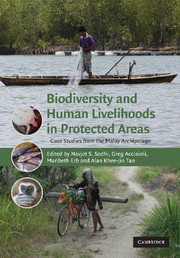Book contents
- Frontmatter
- Contents
- List of contributors
- Acknowledgements
- 1 General introduction
- Part I Conservation needs and priorities
- Part II Conservation with and against people(s)
- 11 Introduction to Part II
- 12 Collaboration, conservation, and community: a conversation between Suraya Afiff and Celia Lowe
- 13 Hands off, hands on: communities and the management of national parks in Indonesia
- 14 Conservation and conflict in Komodo National Park
- 15 Another way to live: developing a programme for local people around Tanjung Puting National Park, Central Kalimantan
- 16 For the people or for the trees? A case study of violence and conservation in Ruteng Nature Recreation Park
- 17 Seas of discontent: conflicting knowledge paradigms within Indonesia's marine environmental arena
- 18 Strategy and subjectivity in co-management of the Lore Lindu National Park (Central Sulawesi, Indonesia)
- 19 Indigenous peoples and parks in Malaysia: issues and questions
- 20 Protecting Chek Jawa: the politics of conservation and memory at the edge of a nation
- 21 Integrating conservation and community participation in protected-area development in Brunei Darussalam
- 22 Conclusion to Part II
- Part III Legal and governance frameworks for conservation
- 29 General conclusion
- Index
- References
12 - Collaboration, conservation, and community: a conversation between Suraya Afiff and Celia Lowe
from Part II - Conservation with and against people(s)
Published online by Cambridge University Press: 12 November 2009
- Frontmatter
- Contents
- List of contributors
- Acknowledgements
- 1 General introduction
- Part I Conservation needs and priorities
- Part II Conservation with and against people(s)
- 11 Introduction to Part II
- 12 Collaboration, conservation, and community: a conversation between Suraya Afiff and Celia Lowe
- 13 Hands off, hands on: communities and the management of national parks in Indonesia
- 14 Conservation and conflict in Komodo National Park
- 15 Another way to live: developing a programme for local people around Tanjung Puting National Park, Central Kalimantan
- 16 For the people or for the trees? A case study of violence and conservation in Ruteng Nature Recreation Park
- 17 Seas of discontent: conflicting knowledge paradigms within Indonesia's marine environmental arena
- 18 Strategy and subjectivity in co-management of the Lore Lindu National Park (Central Sulawesi, Indonesia)
- 19 Indigenous peoples and parks in Malaysia: issues and questions
- 20 Protecting Chek Jawa: the politics of conservation and memory at the edge of a nation
- 21 Integrating conservation and community participation in protected-area development in Brunei Darussalam
- 22 Conclusion to Part II
- Part III Legal and governance frameworks for conservation
- 29 General conclusion
- Index
- References
Summary
Introduction
Questions of biodiversity conservation, national parks, ecoregions and social development are often pursued through transnational collaboration. Rather than a flow of authoritative knowledge moving from the ‘west to the rest’, the problems of nature conservation can usefully be formulated in dialogue across boundaries of spatial and social difference. National parks are especially salient spaces for thinking through what it means for Southeast Asians and Euro-Americans to work together. For one, environmental problems, like smoke from forest fires or fish that spawn in coastal mangroves and school in mid-ocean, do not respect the authority or borders of nation-states. In terms of society, models for thought and social action also engage many kinds of actors across national boundaries and across lines of difference within the nation-state. Projects of biodiversity conservation continually emerge within these collaborative spaces.
In the form of a dialogue, Suraya Afiff (S. A.) and Celia Lowe (C. L.) join together in this chapter to discuss what it means to collaborate around issues of nature conservation within Indonesia's national parks and ecoregions. This dialogue is informed by our combined expertise working in the Sulu-Sulawesi Sea Ecoregion, national parks across Indonesia, and with non-governmental and environmental institutions such as Walhi, Yabshi, Karsa, CI and WWF. Suraya Afiff comes to the conversation with 15 years' experience as a scholar and environmental activist in Indonesia. Originally a student of biology, she is an expert on land conflict in Indonesia.
Information
- Type
- Chapter
- Information
- Biodiversity and Human Livelihoods in Protected AreasCase Studies from the Malay Archipelago, pp. 153 - 164Publisher: Cambridge University PressPrint publication year: 2007
References
Accessibility standard: Unknown
- 1
- Cited by
